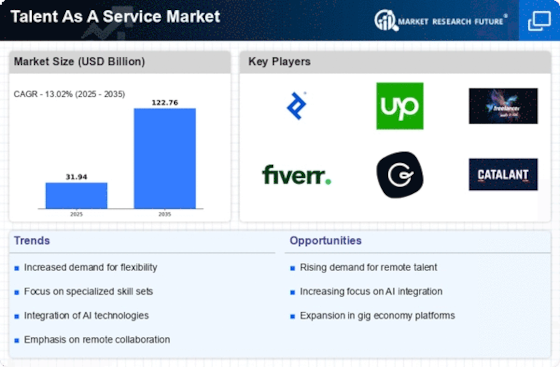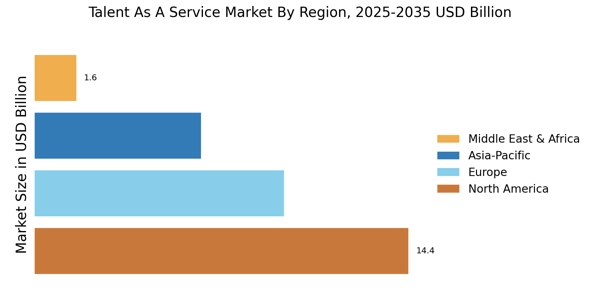Emphasis on Cost Efficiency
Cost efficiency remains a pivotal driver within the Talent As A Service Market. Organizations are continually seeking ways to optimize their operational expenditures, and leveraging Talent As A Service Market solutions presents a viable pathway to achieve this goal. By utilizing external talent pools, companies can reduce overhead costs associated with full-time employees, such as benefits and training. Recent statistics suggest that businesses can save up to 30% on labor costs by adopting Talent As A Service Market models. This financial incentive is likely to propel further adoption of these services as organizations strive to enhance their bottom line.
Shift Towards Project-Based Work
The Talent As A Service Market is witnessing a pronounced shift towards project-based work. As businesses increasingly adopt agile methodologies, there is a rising need for specialized talent to address specific project requirements. This trend is indicative of a broader movement away from traditional employment models towards more dynamic, project-oriented engagements. Data suggests that around 70% of organizations are now favoring project-based hiring to meet their operational needs. This shift is likely to drive the growth of Talent As A Service Market solutions, as companies seek to access the right skills for their projects on a temporary basis.
Increased Demand for Flexible Workforce
The Talent As A Service Market is experiencing a notable shift towards flexible workforce solutions. Organizations are increasingly seeking to adapt to changing market conditions, which necessitates a workforce that can be scaled up or down with relative ease. This flexibility allows companies to respond swiftly to project demands without the long-term commitment associated with traditional hiring. According to recent data, approximately 60% of businesses are now prioritizing flexible staffing solutions, indicating a significant trend towards the adoption of Talent As A Service Market models. This demand is likely to continue growing as companies recognize the benefits of agility in their operations.
Technological Advancements in Recruitment
Technological advancements are reshaping the Talent As A Service Market, particularly in recruitment processes. The integration of artificial intelligence and machine learning into talent acquisition platforms is streamlining the hiring process, making it more efficient and effective. These technologies enable organizations to identify and engage with potential candidates more rapidly, thereby reducing time-to-hire. Data indicates that companies utilizing advanced recruitment technologies can decrease their hiring time by up to 50%. As these technologies continue to evolve, they are expected to play a crucial role in the ongoing transformation of the Talent As A Service Market landscape.
Growing Importance of Diversity and Inclusion
The focus on diversity and inclusion is increasingly influencing the Talent As A Service Market. Organizations are recognizing the value of diverse teams in driving innovation and improving decision-making. As a result, there is a growing demand for talent solutions that prioritize diverse candidate pools. Research shows that companies with diverse workforces are 35% more likely to outperform their competitors. This trend is likely to encourage Talent As A Service Market providers to develop strategies that not only meet client needs but also promote inclusivity, thereby enhancing their market appeal.

















